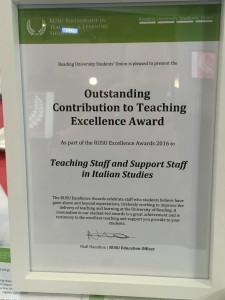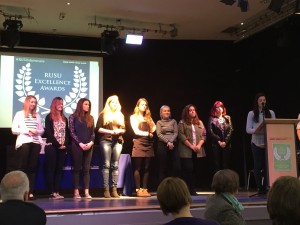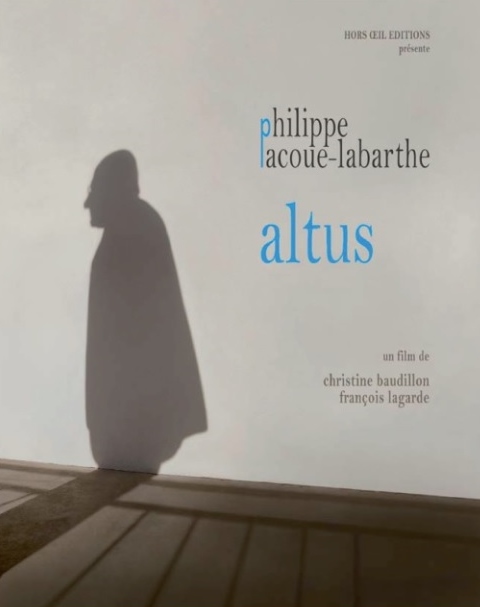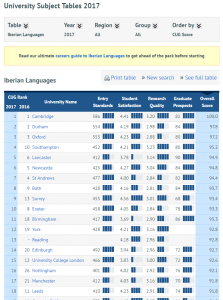In the latest Complete University Guide Spanish came in at 13th in the UK (link here) and Italian at 16th (link here). Well done!
Category Archives: Department Life
Outstanding Contribution to Teaching Excellence Award won by Italian Studies at Reading

Over the past few weeks, RUSU has been running the RUSU Excellence Awards. These are teaching awards which aim to recognise members of University of Reading staff who the students believe have gone above and beyond their expectations, tirelessly working to improve the delivery of their teaching and learning experience.
A special nomination for the entire Italian Department was received and the effort and detail that the Italian students went into to nominate their entire cohort of staff could not be overlooked!
A nomination is a great achievement, and is testimony to the hard work you put into improving the experience of students here at the University. Your efforts have not gone unnoticed!

Some comments that students have made in their nominations:
‘We’ve enjoyed a huge variety of learning styles and approaches – but ultimately they all share the same values and that’s helped to create a really strong foundation for our degree’
‘They’ve created a space both formally and informally where students feel they can be listened to. They’ve done this informally by having an open-door policy, treating us as individuals and always being approachable
‘We all studied abroad in our third year and we’re so thankful, especially to the admin team, for being a support structure when things occasionally went horribly wrong at our visiting institution; undoubtedly their support saw us through the entire experience ‘

How (not) to use technology for language teaching – Workshop with Sascha Stollhans (University of Nottingham)
Do students love technology in the classroom? Can technology replace teaching? What are good tools in the growing pool of educational technology and digital teaching and what can they be used for?
These and more questions were discussed on Wednesday 17 February during a workshop lead by DAAD-Lektor Sascha Stollhans (organized by DAAD-Lektorin Sandra Beer and School TEL Coordinator Enza Siciliano Verruccio) for members of staff and PGR students of the University of Reading as well as for teachers from local schools.

After a theoretical introduction and discussion about questions and concerns, Sascha Stollhans provided us with some inspiring case studies of various tools, social media and web resources to enhance language teaching and learning. The workshop was equally informative as it was engaging, encouraging everyone to try the tools in the workshop.
As more and more institutions expect language tutors to make clever use of technology in their classrooms, we were very happy to have the opportunity to learn more about the effective integration of technology into the language classroom.
Sascha Stollhans is DAAD-Lektor at the University of Nottingham. His main teaching and research areas are German language and linguistics, applied linguistics, second language acquisition and language pedagogy.
Latest publication:
Goria, Cecilia; Speicher, Oranna; Stollhans, Sascha. (Eds). (2016). Innovative language teaching and learning at university: enhancing participation and collaboration. Dublin, Ireland: Research-publishing.net. http://dx.doi.org/10.14705/rpnet.2016.9781908416322
A taste of studying French at Reading University
On Thursday 11th February we hosted four A-level students from various local schools and gave them a taster of undergraduate study at Reading. The opportunity arose from the mentoring scheme of which Eliza (pictured giving a presentation) is part. Such schemes are vital because, alongside imparting knowledge to our own students, we aim to encourage more school pupils to apply for modern languages at degree level. Not just for the sake of our own careers, of course, (I’m really hoping for an academic job at the end of my PhD) but the UK economy does really need language speakers. Language skills deficit costs the UK £48bn a year. Plus, a modern language degree is such a great way to broaden the mind. Anyway, enough of the shameless plug!
The four A-level scholars were invited to attend a final year French Caribbean course run by Julia Waters. As a doctoral researcher, I have been assisting Julia on this course since October and was thrilled to hear that we would have the chance to inspire some young minds. Julia started the class with an introduction, aimed at the scholars, to the legacy of slavery in Caribbean society, French dominance, the importance of the search for identity in postcolonial Caribbean literature, and the concept of Postcolonialism. The four finalists then took to the floor with an enthusiastic and insightful presentation on Patrick Chamoiseau’s L’esclave vieil homme et le molosse, the story of a runaway slave in Martinique. I was personally very pleased with their efforts after assisting them with planning the presentation the week before.
After the presentation, the scholars departed for their campus tour and the seminar carried on as usual. We wish them all the best with their A-levels and hope the experience inspired them to apply for Modern Languages degrees. I also hope they bear Reading in mind during their applications and, who knows, I could be teaching them postcolonial literature one day!
MFL in the UoR meet local and regional schools teachers
 On Wednesday 27 January, staff and students in the Department of Modern Languages and European Studies hosted a 2-hour MFL Teach Meet on the University of Reading campus. With teachers attending from a range of local and regional schools, including St. Crispin’s School, Leighton Park, The Abbey School, Prospect School, Reading School and Bucks School, the meeting was a great opportunity to exchange ideas about how to work together to promote modern languages, manage the transition from GCSE to A level and from A level to University, and how to deal with some of the challenges facing us all as teachers of Modern Languages.
On Wednesday 27 January, staff and students in the Department of Modern Languages and European Studies hosted a 2-hour MFL Teach Meet on the University of Reading campus. With teachers attending from a range of local and regional schools, including St. Crispin’s School, Leighton Park, The Abbey School, Prospect School, Reading School and Bucks School, the meeting was a great opportunity to exchange ideas about how to work together to promote modern languages, manage the transition from GCSE to A level and from A level to University, and how to deal with some of the challenges facing us all as teachers of Modern Languages.
Topics for discussion included: Diversity in the classroom, the use of digital resources and new technology in the classroom, and how to encourage students to go beyond the curriculum. There was some very lively debate, including some very interesting observations from our own students in MLES, and the event finished with a promise to continue these session on a regular basis.
Twas the Night Before Christmas Poem Reading
Official launch of BA Spanish
 On 25 November 2015, The Vice-Chancellor’s Office and the Department for Modern Languages and European Studies hosted the official launch of the new BA Spanish, which brought together University colleagues, the first cohort of students on the programme, local community stakeholders and dignitaries (the Ambassadors for Nicaragua and Panamá, and the cultural attachés for Mexico, Panamá and Cuba). The guests enjoyed Spanish tapas and wonderful live music from Charanga del Norte, and the dancing continued into the evening. We look forward to celebrating the achievements of our first graduates of Ba Spanish programmes four years from now! More pictures of the event in https://www.facebook.com/MLESReading/
On 25 November 2015, The Vice-Chancellor’s Office and the Department for Modern Languages and European Studies hosted the official launch of the new BA Spanish, which brought together University colleagues, the first cohort of students on the programme, local community stakeholders and dignitaries (the Ambassadors for Nicaragua and Panamá, and the cultural attachés for Mexico, Panamá and Cuba). The guests enjoyed Spanish tapas and wonderful live music from Charanga del Norte, and the dancing continued into the evening. We look forward to celebrating the achievements of our first graduates of Ba Spanish programmes four years from now! More pictures of the event in https://www.facebook.com/MLESReading/
UK Premier of the film ‘Altus’
On 12th October 2015 our lecturer in French Studies Dr. John McKeane hosted the UK premiere of the film ‘Altus’ with French film director Christine Baudillon. In ‘Altus’ philosopher Philippe Lacoue-Labarthe visits some of the key sites of Modern Europe and discusses famous works, reads poems aloud, and play-acts in order to undermine the image of the self-important Professor.
Director Christine Baudillon was visiting from Montpellier, where Lacoue-Labarthe lived prior to his death in 2007, and where Dr. McKeane knows a community of philosophers, film-makers, and artists. This links to Dr. McKeane’s research, for instance his book on Lacoue-Labarthe named (Un)Timely Meditations (Legenda, 2015), and informs his teaching at Reading. Dr. McKeane is working on a final-year module ‘How to Think in French’ which is being prepared for 2016-17.
‘How to Think in French’ will look at French ideas of clarity and how it is linked to particular ways of thinking and writing. Since the 18th century and the lumières, the idea of clarity has been presented as crucial to notions such as democracy, human rights, and universalism. But how exactly does it work? The module will seek to answer this by looking at major philosophers from the 18th, 19th, and 20th centuries. Students will learn to perform close readings of texts, learning to analyse the conventions of French thinking and writing; they will also learn to think differently themselves.
Launch of BA Spanish in Reading
On Wednesday 25 November, The Vice-Chancellor Sir David Bell KCB and the staff in Spanish will welcome students, colleagues and friends of the University of Reading to the official launch of the new BA Spanish programme. The evening will be an opportunity to thank the many individuals and groups that have helped to set up Spanish, including a number of embassies and community partners, and to meet and exchange ideas about the new Spanish and Latin American profile at the University.
Guests will enjoy Spanish and Latin American wines and tapas, and will be entertained by the wonderful Charanga del Norte who play traditional Cuban music such as Mambo, Chachachá and Son: http://www.charangasue.com/charanga-del-norte,
There will also be a photo exhibition by the Havana photographer Sonia Almaguer about literacy and reading in revolutionary Cuba.
Watch this space for photos of the launch, and join us on Facebook at www.facebook.com/MLESReading / www.facebook.com/SLASReading
The BA Spanish (Joint Honours) is new for 2015, and now has its first cohort of 26 students. From 2016, we will be offering a beginnners’ entry point for BA Spanish programmes. For further information, please go to our website.
Reading Researchers: The Men with Broken Faces
In addition to our teaching excellence (100% student satisfaction in the most recent National Student Survey!), the Department of Modern Languages and European Studies at the University of Reading is internationally recognised for its research excellence: we ranked 4th in the latest UK rankings for research impact in Modern Languages, and 5th place for research intensity, coming out overall ahead of Oxford and several Russell Group universities, including Leeds, Nottingham, Birmingham, Bristol and Exeter. With so much exciting work going on, from time to time we’d like to highlight some of the innovative and compelling research that members of the department are pursuing in our “Reading Researchers” feature.

Dr Marjorie Gehrhardt of the University of Reading, a cultural historian specialising in 20th-century France
This month, we’re celebrating the publication of a major new book by Dr Marjorie Gehrhardt: The Men with Broken Faces: Gueules Cassées of the First World War (Peter Lang, 2015). Dr Gehrhardt is a cultural historian whose research focuses on war and its representations in twentieth-century Western Europe, with a particular interest in the reintegration of veterans and the role of charities in wartime. She joined the University of Reading in September 2015 and she teaches on several French and European history modules. We’ve asked her to share some of her findings with us:
On 28 June 1919, as delegates in the Paris Peace Conference made their way to the table where the treaty was displayed, they had to walk past five facially injured French soldiers invited there by the French Prime Minister Georges Clemenceau. Although they remained silent during the ceremony, they did not go unnoticed by the attendees.
Despite the place of the disfigured combatants on centre stage at this symbolic event, the presence of these men and the role they played in the war and the interwar period have rarely been studied. This is not because gueules cassées [broken faces], as the disfigured combatants came to be known in France, were very few, or because they did not mix with civilians, on the contrary. The silence surrounding disfigured soldiers and veterans can be accounted for by the painful memories evoked by their faces, and by the fact that they themselves often wished to blend in, not to stand out.

Dr Marjorie Gehrhardt’s new book, The Men with Broken Faces: Gueules Cassées of the First World War (Oxford: Peter Lang, 2015)
In The Men with Broken Faces, I explore one of the lesser-known aspects of the First World War in France, Germany and Great Britain. Using a variety of primary sources, ranging from medical accounts to contemporary press reports and artistic representations, I analyse society’s responses to facial injury as well as the experiences of disfigurement narrated by gueules cassées themselves. The Men with Broken Faces highlights the visibility of facially injured men and discusses different responses to their presence, whilst also interrogating their role and representation in wartime and interwar societies. It underlines the often paradoxical situation of men who sought to lead ordinary lives and yet also became symbols of the war.
For more news about all the world-class research we do in the Department of Modern Languages and European Studies at the University of Reading, as well as updates about our students, staff, and alumni, follow this blog, like us on Facebook, and subscribe to our Twitter feed. You may also wish to contact Dr Marjorie Gehrhardt directly, as she welcomes enquiries from postgraduate students wishing to work on twentieth century cultural history, First World War studies, medical history or the history of the voluntary sector.
If you would like to receive regular updates from our blog, with the latest news about languages at Reading, please enter your email address below:
[subscribe2]






![20160211_112131 copy[2]](https://blogs.reading.ac.uk/mles/files/2016/02/20160211_112131-copy2.jpg)
![20160211_112537 copy[2]](https://blogs.reading.ac.uk/mles/files/2016/02/20160211_112537-copy2.jpg)




